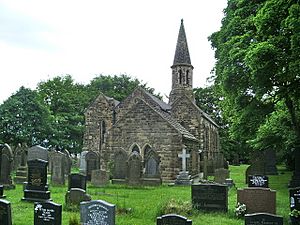St James' Church, Briercliffe facts for kids
Quick facts for kids St James' Church, Briercliffe |
|
|---|---|

St James' Church, Briercliffe, from the east
|
|
| Lua error in Module:Location_map at line 420: attempt to index field 'wikibase' (a nil value). | |
| OS grid reference | SD 867 349 |
| Location | Church Street, Briercliffe, Lancashire |
| Country | England |
| Denomination | Anglican |
| Churchmanship | Liberal Anglo-Catholic |
| Website | St James, Briercliffe |
| History | |
| Status | Parish church |
| Dedication | Saint James the Great |
| Consecrated | 26 September 1841 |
| Architecture | |
| Functional status | Active |
| Heritage designation | Grade II |
| Designated | 10 March 1987 |
| Architect(s) | Edmund Sharpe Paley and Austin |
| Architectural type | Church |
| Style | Gothic Revival |
| Groundbreaking | 1839 |
| Completed | 1992 |
| Specifications | |
| Materials | Sandstone, slate roof |
| Administration | |
| Parish | St James, Briercliffe |
| Deanery | Burnley |
| Archdeaconry | Blackburn |
| Diocese | Blackburn |
| Province | York |
St James' Church is located on Church Street in Briercliffe, Lancashire, England. It is an active church for the Anglican faith. This church is part of the Burnley area, within the larger diocese of Blackburn.
St James' Church is a very special building. It is protected as a Grade II listed building. This means it is important for its history and design.
Contents
History of St James' Church
St James' Church was built between 1839 and 1841. A famous architect named Edmund Sharpe designed it. Building the church cost about £1,300 back then. Most of the money came from people donating. The land for the church was given by the Duke of Buccleuch.
The church was officially opened and blessed on September 26, 1841. Bishop John Bird Sumner of Chester led the ceremony. At first, 515 people could sit inside the church. In 1843, the area around the church became its own special church district.
In 1869, a new steeple was added to the church. Other changes were made by Paley and Austin. They were architects who took over Edmund Sharpe's business. New pews were put in during 1881, and the old pulpit was removed. In 1992, the choir room was made bigger. A new meeting room was also built.
Church Design and Features
Outside the Church
The church is built from sandstone and has a slate roof. It is designed in the Early English Gothic style. This style was popular for churches a long time ago. The church has a main area called a nave and a shorter section called a chancel. There is also a tower at the west end.
The roof is very steep. It looks like it's divided into three parts. However, inside, the church is one big room with a flat ceiling. The walls of the nave have buttresses. These are supports that stick out. Between these supports are tall, narrow windows called lancet windows.
The tower has two main parts. The bottom part has a door on the west side. Above the door are more lancet windows. From this part, an eight-sided section rises up. This section holds the church bells. On top of that is a short, eight-sided spire. At the east end of the church, there is a special window. It has three lancet windows grouped together.
Inside the Church
Inside St James' Church, there are galleries on three sides. These are like balconies. They are held up by cast iron columns. The galleries have box pews, which are like enclosed seating areas.
The church has a large organ with two keyboards. It was built in 1865 by Foster and Andrews. This company was from Hull. The same company made improvements to the organ in 1901 and 1906. In 1927, another company cleaned the organ. It was restored again in 1989.
What Makes the Church Special?
Some experts have described St James' Church in different ways. One book called it "a small, rather strange church." However, another expert, Hughes, disagreed. He said it is "one of Edmund Sharpe's more delightful designs." The official description from the National Heritage List for England says it is "unusually unaltered." This means it still looks very much like it did when it was first built in the 1800s.
Churchyard Features
The churchyard is the area around the church. It contains the war graves of seven soldiers. Five of these soldiers died in World War I. The other two soldiers died in World War II.
More Information
- Listed buildings in Briercliffe
- List of architectural works by Edmund Sharpe
- List of ecclesiastical works by Paley and Austin
 | Ernest Everett Just |
 | Mary Jackson |
 | Emmett Chappelle |
 | Marie Maynard Daly |

